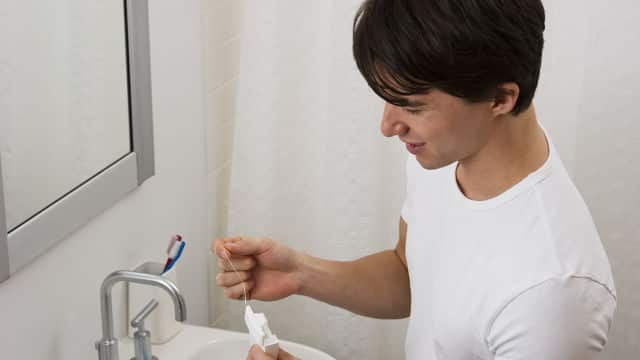You're brushing your teeth and notice a bit of pink when you spit out the toothpaste. You might notice some bleeding when you floss. Although the smallest amount of blood might not seem like a big deal, if your gums are bleeding consistently, you shouldn't ignore it. Bleeding gums can happen for many reasons, from gingivitis to a side effect of pregnancy. Changing your oral care routine can also make your gums bleed, at least at first. Here's what you can do if you do notice some bleeding.
Step Up Your Oral Care Game
The biggest cause of bleeding gums is plaque build-up along the gum line. When you don't remove plaque in a timely manner, it hardens into tartar, a calcified material that plaque adheres to and continues to irritate the gums, which cause them to bleed and can progress into more advanced forms of gum disease. The best way to reduce plaque build-up and your risk for bleeding gums is to ramp up your oral care routine.
Remember to brush twice a day using a fluoride toothpaste. Floss at least once a day as well; gums can sometimes stop bleeding with regular flossing. And of course, seeing your dentist on a regular basis – not just when you have a problem or concern – is also a must to keep your mouth in the best shape.
Take a Look at Your Tools
If you do brush and floss regularly and get your semi-annual dental visit in, your oral hygiene care tools could be what's causing your gums bleed. Although it might seem that a toothbrush with medium or firm bristles cleans your teeth and gums more deeply or thoroughly, harder bristles usually just cause irritation – which can be why your gums are bleeding. It is recommended by dentists to use a toothbrush with soft bristles, which cleans your teeth and gums thoroughly without irritation.
In some cases, it might not be the tools that are causing the bleeding, but the way you're using them. If you've been out of the habit of flossing, start again. You might see a bit of blood at your gum line but remember to always use a gentle hand and avoid pressing the floss against your teeth and gums too hard.
Maintain a Healthy Diet
What you eat and when you eat it also plays a part in keeping your gums from bleeding. Foods that contain lots of sugar or simple carbohydrates increase your risk for tooth and gum problems, as sugar creates an ideal environment for plaque to form. Commit to a diet that is low in sugar and high in the necessary nutrients found in foods like vegetables. You don't have to ban sweets from your life. Just remember to eat them in moderation, and brush after these snacks so that the sugar doesn't have time to stick around.
Consider Your Medicine
Certain medicines also increase the likelihood that your gums will bleed. Some over-the-counter pain relievers, like aspirin, thin the blood and can therefore increase bleeding. It's also possible for a prescription medication to cause gum bleeding. If that is the case, your doctor might prescribe a different dose or a different medication altogether. Always talk to your doctor if you think a medication is causing side effects, even if they seem mild.
See Your Dentist
If changing your oral care habits, adjusting your medications, and maintaining a healthy diet doesn't help your gums stop bleeding, your next step should be to make an appointment with your dentist. He will examine your teeth and gums and determine if you have a more serious condition, such as advanced gum disease. Your dentist might also take an x-ray of the teeth and gums. If he believes treatment is needed, such as a deep cleaning or periodontal surgery, you'll likely visit with a periodontist, who specializes in treating gum disease.
In some cases, bleeding gums are no big deal, but in certain instances can warrant professional treatment. With the right diagnosis and personal care, bleeding gums can become a thing of the past.







